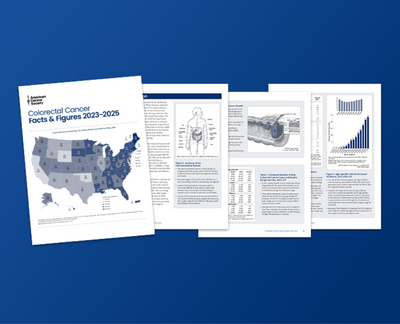Press Releases
ATLANTA, March 1, 2023 – Colorectal cancer is swiftly shifting to more advanced disease and younger individuals according to Colorectal Cancer Statistics 2023, a new report on cancer facts and trends by the American Cancer Society (ACS). Researchers showed the proportion of individuals in the United States diagnosed with advanced-stage colorectal cancer (CRC) increased from 52% in the mid-2000s to 60% in 2019. In addition, diagnoses of people under 55 years of age doubled from 11% (1 in 10) in 1995 to 20% (1 in 5) in 2019. Overall, in 2023, an estimated 153,020 people will be diagnosed with CRC in the U.S., and 52,550 people will die from the disease. These major findings are to be published today in CA: A Cancer Journal for Clinicians, alongside its consumer-friendly companion, Colorectal Cancer Facts & Figures 2023-2025, available on cancer.org.
“We know rates are increasing in young people, but it’s alarming to see how rapidly the whole patient population is shifting younger, despite shrinking numbers in the overall population,” said Rebecca Siegel, senior scientific director, surveillance research at the American Cancer Society, and lead author of the report. “The trend toward more advanced disease in people of all ages is also surprising and should motivate everyone 45 and older to get screened.”
CRC is the third most commonly diagnosed cancer and the third leading cause of cancer death in both men and women in the U.S. CRC incidence declined rapidly in people 50 and older during the 2000s, largely because of increased screening with colonoscopy, which can prevent cancer by removing premalignant polyps. However, this progress has slowed over the past decade with decreasing trends now confined to people 65 and older.
For the report, researchers used incidence data available through 2019 from 50 states and the District of Columbia from the Surveillance, Epidemiology, and End Results (SEER) program of the National Cancer Institute and the National Program of Cancer Registries of the Centers for Disease Control and Prevention, as provided by the North American Association of Central Cancer Registries. National mortality data available through 2020 were provided by the National Center for Health Statistics.
Other key findings from the report include:
- Progress against CRC has slowed from declines in incidence and mortality of 3%-4% per year during the 2000s to 1% per year for incidence and 2% per year for mortality during the past decade.
- The CRC incidence rate was 33% higher in men (41.5 per 100,000) than in women (31.2 per 100,000) during 2015-2019, likely reflecting differences in risk factor prevalence, such as excess body weight, processed meat consumption, and historical smoking.
- Declining incidence rates are confined to ages 65 and older since 2011; incidence rates have stabilized in ages 50-64 years and have increased by 2% per year in people younger than 50 years of age, as well as in people ages 50-54 years.
- Diagnoses have shifted to more advanced disease; the proportion of cancers that are regional (spread to nearby lymph nodes, organs, or tissues) or distant (spread to distant organs/lymph nodes) stage increased from a low of 52% in the mid-2000s to 60% in 2019 despite increased screening.
- CRC death rates have increased since around 2005 by 1% annually in people younger than 50 years and by 0.6% in people ages 50-54.
- CRC incidence is highest in people who are Alaska Native (88.5 per 100,000), American Indian (46.0 per 100,000), or Black (41.7 per 100,000; versus 35.7 per 100,000 in Whites); mortality patterns are similar, with rates highest in people who are Alaska Native (50.5 per 100,000), American Indian (17.5 per 100,000), or Black (17.6 per 100,000; versus 13.1 per 100,000 in Whites).
“We have to address why the rates in young adults continue to trend in the wrong direction,” said Dr. Ahmedin Jemal, senior vice president, surveillance and health equity science at the American Cancer Society and senior author of the study. “We need to invest more in research to uncover the causes of the rising trends and to discover new treatment for advanced-stage diseases to reduce the morbidity and mortality associated with this disease in this young population, who are raising families and supporting other family members.”
“These highly concerning data illustrate the urgent need to invest in targeted cancer research studies dedicated to understanding and preventing early-onset colorectal cancer,” said Dr. Karen E. Knudsen, CEO of the American Cancer Society. “The shift to diagnosis of more advanced disease also underscores the importance of screening and early detection, which saves lives.”
ACS’s advocacy affiliate, the American Cancer Society Cancer Action Network (ACS CAN), advocates for policy solutions that eliminate barriers to colorectal cancer screening, including those that ensure coverage of follow-on colonoscopies after a positive non-invasive test without cost sharing. In November 2022, the Centers for Medicare and Medicaid Services (CMS) finalized its rule for Medicare to cover colonoscopies after non-invasive screening tests and lower the minimum age of screening to 45. To date, 11 states have passed such laws that would eliminate cost-sharing and lower the screening age to 45. ACS CAN will continue to advocate for the implementation of these policies at the state level.
ACS authors Dr. Nikita Wagle and Dr. Robert Smith also participated in the study.
The edition of Colorectal Cancer Facts & Figures 2023-2025 introduces a major refresh of the ACS supplemental facts & figures reports, providing data in a more concise consumer-friendly format.
# # #
About the American Cancer Society
The American Cancer Society is a leading cancer-fighting organization with a vision to end cancer as we know it, for everyone. For more than 100 years, we have been improving the lives of people with cancer and their families as the only organization combating cancer through advocacy, research, and patient support. We are committed to ensuring everyone has an opportunity to prevent, detect, treat, and survive cancer. To learn more, visit cancer.org or call our 24/7 helpline at 1-800-227-2345. Connect with us on Facebook, Twitter, and Instagram.
